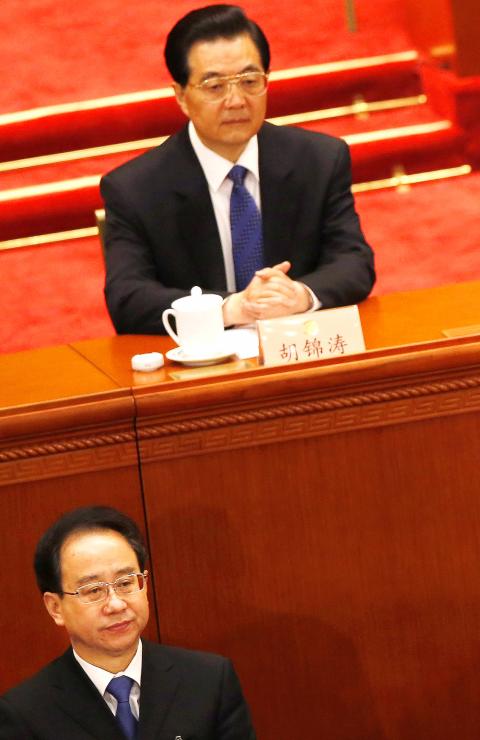Former Chinese president Hu Jintao’s (胡錦濤) top aide has been arrested on corruption charges, stripped of his party membership and removed from all government positions, China’s state media said on Monday.
The ruling by the Chinese Communist Party’s (CCP) Politburo Standing Committee came seven months after Ling Jihua (令計劃) was placed under internal investigation for disciplinary violations.
The fall of Ling, whose former position is comparable to the US president’s chief of staff, has come amid a stern anti-corruption campaign by Hu’s successor, Chinese President Xi Jinping (習近平). The campaign is seen by many as a means to not only restore public confidence in the ruling party, but also to root out threats to Xi’s political dominance.

Photo: EPA
Jeffrey Bader, a senior fellow at Washington-based think tank Brookings Institution, said the expulsion of Ling from the party and the arrest was long expected.
“It’s the sign of the determination of Xi Jinpng and the leadership to go after high-level actors in the anti-corruption campaign,” Bader said.
Ling held a sensitive position, but never made it into the party’s top echelon.
His disgrace followed the fall of two more prominent Chinese political figures — former politburo member Bo Xilai (薄熙來) and Zhou Yongkang (周永康), who served on the Politburo Standing Committee until his 2012 retirement. However, unlike Bo and Zhou, Ling had no clear evidence of opposing Xi, and the Youth League faction to which Ling belonged has not been politically targeted at the highest level, Tsang said.
Ling, formerly head of the party’s general office under Hu, became well known in China in 2012 when his son crashed a Ferrari in Beijing with two nude or half-dressed women in the vehicle, according to various reports. Ling was accused of covering up the scandal.
Xinhua news agency said the internal investigation found Ling took huge amounts of money through bribery and used his position to seek benefits for others. It said Ling had allowed his family to benefit financially from his political influence.
In other developments, Chinese authorities are to prosecute one of the former top graft busters in Guangdong Province for corrupt practices, including bribery and interference in corruption investigations, the government said yesterday.
Zhong Shijian (鐘世堅), who had been head of Guangdong’s corruption prevention bureau, has been expelled from the CCP and handed over to legal authorities for prosecution, the party’s graft-fighting Central Commission for Discipline Inspection said.
A probe found that Zhong had interfered in cases, leaked details of investigations to those being probed, took bribes and gave bribes in exchange for promotions, among other crimes, it said.

The Ministry of the Interior (MOI) is to tighten rules for candidates running for public office, requiring them to declare that they do not hold a Chinese household registration or passport, and that they possess no other foreign citizenship. The requirement was set out in a draft amendment to the Enforcement Rules of the Public Officials Election and Recall Act (公職人員選舉罷免法 ) released by the ministry on Thursday. Under the proposal, candidates would need to make the declaration when submitting their registration forms, which would be published in the official election bulletin. The move follows the removal of several elected officials who were

The Republic of China (ROC) is celebrating its 114th Double Ten National Day today, featuring military parades and a variety of performances and speeches in front of the Presidential Office in Taipei. The Taiwan Taiko Association opened the celebrations with a 100-drummer performance, including young percussionists. As per tradition, an air force Mirage 2000 fighter jet flew over the Presidential Office as a part of the performance. The Honor Guards of the ROC and its marching band also heralded in a military parade. Students from Taichung's Shin Min High School then followed with a colorful performance using floral imagery to represent Taiwan's alternate name

FOUR DESIGNATED AREAS: Notices were issued for live-fire exercises in waters south and northwest of Penghu, northeast of Keelung and west of Kaohsiung, they said The military is planning three major annual exercises across the army, navy and air force this month, with the navy’s “Hai Chiang” (海強, “Sea Strong”) drills running from today through Thursday, the Ministry of National Defense said yesterday. The Hai Chiang exercise, which is to take place in waters surrounding Taiwan, would feature P-3C Orion maritime patrol aircraft and S-70C anti-submarine helicopters, the ministry said, adding that the drills aim to bolster the nation’s offshore defensive capabilities. China has intensified military and psychological pressure against Taiwan, repeatedly sending warplanes and vessels into areas near the nation’s air defense identification zone and across

A Chinese takeover of Taiwan would severely threaten the national security of the US, Japan, the Philippines and other nations, while global economic losses could reach US$10 trillion, National Security Council Deputy Secretary-General Lin Fei-fan (林飛帆) wrote in an article published yesterday in Foreign Affairs. “The future of Taiwan is not merely a regional concern; it is a test of whether the international order can withstand the pressure of authoritarian expansionism,” Lin wrote in the article titled “Taiwan’s Plan for Peace Through Strength — How Investments in Resilience Can Deter Beijing.” Chinese President Xi Jinping’s (習近平) intent to take Taiwan by force